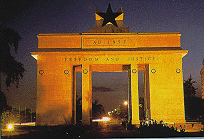
Independence Square
©2001: Tourist Office
|
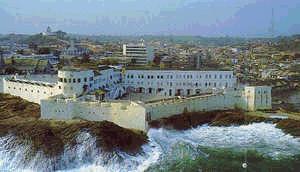
Elmina
©2001: Tourist Office
|
|
|
After suffering almost two decades of severe decline, Ghana again appears to be on the upswing, with a slowly by
steady growing economy and a government cautiously joining the ranks of emerging African democracies. Ghana is
famous for its typical African markets with the unique Kente cloth textiles. Stools have a significant role in
Ghana’s society. Ghana is an unexpected Paradise with its Volta River Estuary - most beautiful and so much potential.
Lake Volta is the world's largest artificial lake. Much of the attraction of Ghana is based upon its legacy as the
center of the gold, ivory, and slave trade during the 17th and 18th centuries, when the mighty Ashanti empire held
sway here. However, Ghana also possesses one of the best game reserves in West Africa, a multitude of good beaches,
and plenty of hospitality.
|
Hordes of tourists, especially Americans, come every day to gawk at unusual coffins, ranging from brightly coloured
luxury cars, planes, butterflies, lobsters, shoes, peppers and coconuts to hoes and shovels in Nungua. When Ghanaian
coffinmaker Ata Owoo's grandmother died more than five decades ago, he started a trend that turned the dusty little
town of Nungua into one of the country's main tourist attractions. Joseph Tetteh Ashong, who was taught the craft by
one of Owoo's earliest apprentices, said: "Owoo's grandmother had never left the village. So he decided to shape her
coffin like an aeroplane. That solitary coffin in 1950 was to spawn a cottage industry in Nungua and the nearby town
of Teshie, both lying between the capital city Accra and the country's main port city of Tema. Orders come in from
the US and Europe. In Europe, it is mainly from France and Germany.
Kofi A. Annan:
|
Ghanaian Kofi Annan, Secretary-General of the United Nations is Awarded the Nobel Prize for Peace in 2001 together
with the United Nations as organization in recognition of their efforts in establishing peace and combating AIDS.
US-Africa would like to congratulate Mr. Annan for this achievement and for being unanimously elected Secretary
General of the United Nations for a second term in 2001. Africa is very proud to have such a great son.
|
|
|
The Nobel Peace Prize Committee cited Annan, the first U.N. secretary general to emerge from the lower ranks of the
U.N.'s civil service, for promoting human rights, combating AIDS and "bringing new life" to an organization that was
paralyzed by big power squabbles during much of its existence. The soft-spoken, 63-year-old Ghanaian diplomat and the
United Nations represented a popular and uncontroversial choice for the Nobel committee's 100-year anniversary. The
premier international forum for promoting peace, the United Nations edged out several front-runners, including Pope
John Paul II and the International Red Cross. Mr. Annan said he and his staff were honored by the award. "It's a
wonderful feeling and a great encouragement for us and the organization, for the work we have done until now. It
challenges us to do more and to do better and to not rest on our laurels." The Nobel committee also sought to
recognize the 50,000 U.N. employees stationed in New York headquarters and at U.N. missions around the globe for
"their work for a better organized and more peaceful world." It was the second time that a U.N. secretary general
has been awarded the Nobel Peace Prize and the first time that the United Nations organization as a whole was honored.
In 1961, Dag Hammarskjold of Sweden was awarded the prize. And it was the fourteenth time that an individual or
organization associated with the United Nations received the prize.
Mr. Annan was born in Kumasi, Ghana, on 8 April 1938. He studied at the University of Science and Technology in Kumasi
and completed his undergraduate work in economics at Macalester College in St. Paul, Minnesota, U.S.A., in 1961.
From 1961 to 1962, he undertook graduate studies in economics at the Institut universitaire des hautes études
internationales in Geneva. As a 1971-1972 Sloan Fellow at the Massachusetts Institute of Technology, Mr. Annan
received a Master of Science degree in management. Kofi Annan joined the United Nations in 1962 as a 24-year-old
administrative officer at the World Health Organization. With U.S. backing, he was elevated to secretary general
in 1997 after his successor, the former Egyptian foreign minister Boutros Boutros Ghali, was blocked from serving
a second term by the Clinton administration. Annan was elected to a second term in June 2001. He will begin his
second five-year term in January 2002.
Accra:
Accra is the capital and the largest city of Ghana, as well as being the executive, financial, and educational
center of Ghana. The word Accra comes from the Akan word nkran, which means the black ants that are found amply
in this region. Major buildings, other than the forts, are the Korle Bu General Hospital, which includes the
Ghana Medical School, the Holy Spirit (Roman Catholic), Holy Trinity (Anglican), and Methodist churches. Other
places of interest are national records and the national museum. Also located here are the Council for Scientific
and Industrial Research, and the Ghana Academy of Arts and Sciences. The city also has a race course and a football
stadium. Ceremonial parades are held in Independence Arch, in Black Star Square.
Culture
Ghana is a great place. It's hard to tell you specifically about Ghanaian culture since there are so many different
cultural groups, it all depends on where you are going. A good idea would be to learn about Akan culture which covers
most of the largest tribes including the Ashanti and Fanti by visiting this link to
Ghana. Other main groups in the south
are the Ga around Accra and the Ewe from the East/Volta area who up until now had much of the political control of Ghana.
Travelling north you have the Dagomba people who are again very different. In the very north areas the tribes change
again, the different groups are smaller and have more in common with the people of Burkina Faso. In the north Islam is
the predominant religion while in the south it is
Christianity. There is still a strong element of traditional religion everywhere though. You'll find coexistence of
religions reasonably harmonious. The old Ashanti Kingdom in the centre of Ghana is world famous for its culture,
traditions, festivals and skilful crafts products. In Kumasi, the residence of the Ashanti king, you can find out
about these people and its kingdoms in the various museums of the city.
|
|
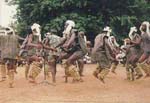
Gologo Festival
©2001: Tourist Office
|

Brenu Beach
©2001: Tourist Office
|
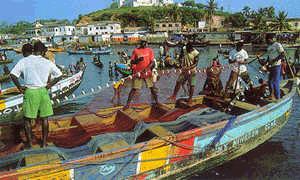
Elmina
©2001: Tourist Office
|
|
Tourism
Many travellers praise the Ghanaian people for their friendliness, sincerity and pride. On the street, on the market,
in a bar: you will never have to wait long to have a chat with someone. Right away you will hear: Browny (white person),
where are you heading? You almost always meet somebody who feels like starting a little conversation. Ghana has a very
rich history and culture. In the coastal region you can enjoy beautiful palm beaches and you can rummage about small
fisherman villages. In the forts on the coast you can learn about the shameful history of the European, colonial
oppression and slave trade. Ghana is the home of a few beautiful nature parks and protected natural reservations.
In the Kakum Nature Park, you can walk through the tips of the rain forest by means of suspension bridges. In the
Molé park you have a good chance to see a nice variety of large and small game. In Boabeng you can observe how the
people of the village live together with a monkey colony. If you would like to see all kinds of different butterflies,
then it is worthwhile to go and visit the Bobiri reserve.
Craft villages
In the region surrounding Kumasi are four settlements known as the craft villages. They are the towns of Ahwiaa,
Ntonso, Kurofuforum, and Bonwire, and their inhabitants have been the royal artisans for the Asantehene for
generations. Each craft village has a particular claim to artistic fame. Bonwire is the capital of the Kente
cloth, while Ntonso boasts the Adinkra cloth. Ahwiaa produces outstanding carved figures, including Ghana's
traditional fertility doll, and Kurofuforum specializes in the casting of brass.
The coast
Ghana has a few beautiful beaches with hotels that range from luxurious to very simple. The restaurants have
delicious fresh lobster and shrimps to offer. The sea is not safe for swimming due to the dangerous undercurrents.
The coast of Ghana, which in former days was called the Gold Coast, has been an object of many wars and dominations
since the 15th century. Initially people were after the gold that was dug up in the inland, but later business
focussed on the more lucrative trade of slaves. There are still many old trade posts, in some of which expositions
have been set up and where good guided tours are given, like in the trade forts of Elmina and Cape Coast. Ghana's
role as a focus of the gold, ivory, and slave trade resulted in the construction of an entire string of colonial
forts along its coastline, and many remain as picturesque legacies of that era. The forts at Dixcove, Elmina,
Cape Cove, and Apam are all open to tourists, and some even offer accommodation and meals. While the forts are
reason enough to tour the coast, the area's outstanding beaches are an equally compelling attraction.
Kakum Nature Park
Like in the rest of Africa, the rain forest in Ghana is disappearing rapidly. In Kakum you have the opportunity to
see one of the last parts of rain forest from a very special corner. On suspension bridges you can walk through the
tops of the rain forest. Up there you sometimes are lifted 30 meters from the ground. You can enjoy a beautiful view
from up here and it is a good occasion for bird and butterfly spotting. With some luck you can also get a glimpse of
the Spot-nose, Campbell's or Colobus monkeys.
Mole National Park
Mole National Park which extends over 500 sq. km., is a fairly basic but eminently inexpensive destination for wildlife
enthusiasts. The game population is abundant, and includes elephants, various species of antelope, an abundant and
diverse bird population, monkeys and crocodiles, and even a small number of lions. Unlike many other wildlife
reserves in Africa, Mole offers visitors the opportunity to drive or walk throughout the park at very reasonable
costs. The only place to stay is the park hotel, which offers excellent views out over the surrounding parkland.
Kumasi
Kumasi, with about 800.000 inhabitants the second city of Ghana is beautifully situated between green hills, and was
the capital of the Ashanti empire. It continues to serve as the cultural center of the Ashanti people. Here you will
find the largest market in West Africa. You can buy any kind of product here, but also have your hair braided in the
"hairdressers lane", buy something at a goldsmith or tinsmith or listen to a sermon. Although the historic city was
destroyed almost a century ago, modern Kumasi contains a good cultural center and museum as well as the modern
palace of the Asantehene.
Ho and surroundings
Ho is a small but lively city in the South East of Ghana. It is located at the foot of the Kaba hills and is therefore
the perfect starting place for walks and visits to villages and water falls in the surroundings. Kpetoe, just a
few kilometres from Ho, is an important centre of the famous, colourful Kente fabric. In Kpandu, a port city at
the Volta storage reservoir you can enjoy the lively fish market and you can make a tour with a local fishing
boat on the lake. There are a few villages in the surroundings where you can live the hospitality of the people.
By staying in one of these villages you will be able to get a good inside view on Ghanese life. You will be able
to try traditional dishes and palmwine. It is also possible to go with a farmer to his fields or see how honey
is taken from bee hives. Not far away from Ho is the Akosombo dam that is responsible for the largest artificial
lake in the world, the Volta lake. This dam is very important for the electricity supply of Ghana, Togo and Benin.
Techiman and surroundings
Around Techiman you can make a walk through the holy forest where the spirit of the Akangod Taakora, the god of the
river, lives. It leads you passed holy sites, dedicated to the lower gods, rocks shaped like forts and a cliff.
From Bosomtwi Rock, that served as a view point during the tribe wars, you have a great view of the surroundings.
You can spend the night in a near village, where you can take part in the daily way of life. In the evening the
inhabitants will treat you to traditional stories, dance and music.
Boabeng/Fiema
Also the twin towns of Boabeng and Fiema have a river god. The monkeys are supposed to be the representatives of
this god. Al around the village you can see these sacred Mona and Colobus Monkeys. Around the village, the natural
surroundings of the monkeys, the jungle, is protected. This way it is quite a walk to get to the farming land.
When a monkey dies, it will be buried with all kinds of rituals. A guide can give you a tour through the village
and the forest. Here you can spend the night in a simple, clean guesthouse where the water comes from a pump.
Larabanga
At the entrance of the Mole Parc is the village of Larabanga. In this Muslim village the oldest mosque of West Africa
is located. A few enthusiastic inhabitants of the village are determined to take some advantage of the flow of
tourists that is attracted by the wildlife park. There is a tourist committee that gives tours through the village
and shows people around the fields of a farmer. You can visit the village from the lodge in the Park, but you may
also spend the night in the village itself, since it offers some simple accommodation. At night it is possible to
take part in musical festivities and dances.
Economy:
 Cocoa bean bags
Cocoa bean bags
©2002: Marcel US-Africa
|
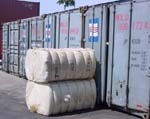 Cotton bags
Cotton bags
©2002: Marcel US-Africa
|
 Cotton transportation
Cotton transportation
©2002: Marcel US-Africa
|
|
Ghana’s is the world’s second producer of cocao after Ivory Coast. Although 58% of the land is fertile and
suitable for farming, only 11% is actually under cultivation. The only other agricultural export is wood. Well
endowed with natural resources, Ghana has twice the per capita output of the poorer countries in West Africa.
Even so, it remains heavily dependent on international financial and technical assistance. Ghana has a small
oil deposits which it is beginning to exploit. The old name of Gold Coast is derived from the fact that Ghana
is the world’s 6th producer of gold, and the 5th of diamonds. Ghana also has a series of indutries, from ship-building
to refineries, as well as a large hydro-electric scheme on the Akosombo dam. Both roads and railways are well
developed. Ghana’s economy is mainly rural: cocoa, timber and pineapples are the main export crops; and mining
(mainly gold) has become one of the biggest sources of foreign exchange. The emerging industrial sector’s products
include cassava, fruits and cocoa by-products. Max Havelaar Pine Apple and Banana plantations are an example of
Fair Trade in Ghana.
|
MOL Shipping Line, a Japanese shipping line, is making a success story in Africa; their last few years have never
been so good in history and African business is booming for them. They are shipping in huge numbers of containers,
while at the same time exporting full containers with commodities such as Cocoa, Pine Apples etc. The Chocolate
that the Western world is eating is made of the Cocoa Beans that the little farmers in Africa are collecting;
without them there would be no Chocolate…. (MOL would be delighted with this free-publication says Marcel Stappers:
our man in Accra). Despite the fact that Ghana is the world's biggest producer of cocoa, when visiting Ghana bring
chocolate with you, they have pretty awful chocolate (don't try telling a Ghanaian this).
"Cocoa originated in Mexo-America and was cultivated and traded by Mayans and Aztecs long before it was brought
to Africa. In Africa, the first cocoa was grown in Fernando Po (in the Bight of Benin Atlantic Ocean). It was
later introduced into Ghana by a smuggler named Tettie Quarshie who sneaked some seedlings into the country in 1878".
(Bob Burch/Montreal)
Agriculture products: cocoa, rice, coffee, cassava (tapioca), peanuts, corn, shea nuts, bananas; timber.
Exports: $1.7 billion (f.o.b., 1999).
Export commodities: gold, cocoa, timber, tuna, bauxite, aluminum, manganese ore, diamonds.
Export partners: Togo, UK, Italy, Netherlands, Germany, US, France (1998).
Imports: $2.5 billion (f.o.b., 1999).
Import commodities: capital equipment, petroleum, food.
Import partners: UK, Nigeria, US, Germany, Italy, Spain (1998).
History:
The Dogomba and Mamprussi states flourished in the 12th and 13th centuries in the north while Akan speakers,
the Ashanti and the Fanti, migrated from the savanna and formed a series of small states below the forest line.
The Portuguese first settled on the coast of what is now Ghana in 1482. Europeans - British, French, Dutch, Swedes
and Danes, in addition to the Portugese, arrived at various centuries and built forts here. Ghana became a British
colony under the name of Gold Coast in 1900. It was extended to include part of the former German colony of Togoland
at the end of World War I in 1919. Following the elections won by Dr Krame Nkrumah and his Party in the early 1950's,
the Gold Coast and British Togoland became in 1957 the independent state of Ghana.
Ghana is a country of firsts. In 1957, Ghana became the first country in Sub-Saharan Africa to emerge from colonialism.
Nkrumah was overthrown in 1966, and after different military and civilian governments. Flt Lt Jerry John Rawlings,
became head of state in a coup led by junior officers in 1979. He only remained in power a few months and after
losing the elections to Dr Hilla Limann and the People's NationalParty, he stepped down.
Ghana experienced the highest GNP on the continent before an economic crisis in the late 1970s, and it experienced
the trauma of military takeovers long before that became a trend in the region. Ghana stabilised in the mid-1980s
and political reform began A new Constitution was approved in a referendum in April 1992 and political parties were
unbanned. Rawlings again took power in a coup on 31 December 1981. The Constitution was abolished, Parliament
dissolved, and political parties banned. Flt Lt Rawlings assumed the Chairmanship of the Provisional National
Defence Council (PNDC).
Ghana has also rebounded after launching one of the first and more stringent economic recovery programs in the region
nearly a decade and a half ago. It is now pioneering the "Comprehensive Development Framework" (CDF) as a new way of
managing the development process. The Constitution guarantees democratic freedom. The first presidential election
for 13 years took place in November 1992. Rawlings, standing for the National Democratic Congress (NDC), was the
winner with 58% of the vote. A new constitution was introduced in 1992, and Ghana’s first multiparty elections
were organized shortly thereafter. In 1996, Ghana enjoyed a smooth second-term election, conducted with full
participation of all political parties and of the Ghanaian electorate, strengthening democratic institutions.
Local assemblies were elected in all 110 Districts, and are assuming increasing responsibility for service
delivery to the people of their Districts. Community elections were conducted successfully in June 1998, through
non-partisan means, thus bringing representation down to the village and sub-District level.
Good to know:
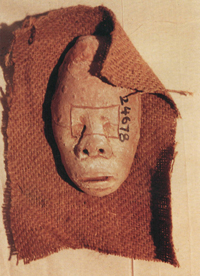
©art: Kofi Setordji
|
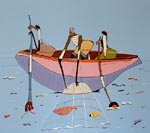
©art: Kofi Setordji
|
|
|
Accra/Ghana April 2004: In collaboration with well respected charitable organizations, the African/African
-American Music Entertainment and Cait Entertainment would be organizing a festival. This project consists of a music
festival to be held in Accra, Ghana, during a 4 day event in May 2004. Artists and guest artists from the entire
African continent and from around the world will perform during these four (4) days of tribute to the children
victims of AIDS and HIV on the continent and throughout the world. These artists will record an album-containing
maximum of ten tracks. Songs- in English, French, Spanish, Swahili, and a variety of other African dialects - will
reach millions of people.
For further details & information CLICK HERE
|
Ghanaians are very hospitable and you'll find many people trying to make you feel welcome. Greetings are very important.
Make sure you learn the proper
greeting for where you are going. If you visit a Ghanaian household you'll invariably be welcomed and offered water or
a drink (this is an integral part of the welcome). Remember that older people play a very important role in the household
and are considered the keepers of wisdom so if you walk into a household always greets the eldest first.
Learn a few phrases in the language appropriate for your area. It makes a big difference in how people perceive you,
and even if you struggle with trying to make it sound right people will appreciate the effort.
Enabling us to improve the quality of the content, if you have additonal information, remarks or suggestions, please share it with us by e-mail.
|